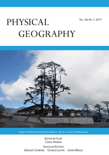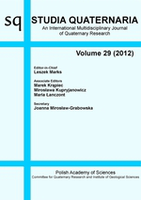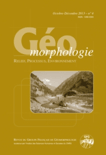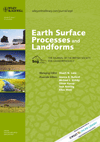
Revista Brasileira de Geomorfologia
Scope & Guideline
Pioneering Insights into Environmental Change
Introduction
Aims and Scopes
- Geomorphological Mapping and Analysis:
The journal frequently publishes studies that involve detailed geomorphological mapping, utilizing advanced techniques such as GIS and remote sensing to analyze landforms and their characteristics. - Environmental Dynamics and Geomorphology:
Research often explores the relationship between geomorphological features and environmental factors, including hydrology, climate change, and human activities, highlighting how these interactions shape landscapes. - Coastal and Fluvial Geomorphology:
A significant focus is on coastal and riverine environments, investigating processes such as erosion, sediment transport, and the morphological evolution of these dynamic systems. - Application of Geomorphological Research to Management and Planning:
The journal emphasizes the application of geomorphological studies to land use planning, environmental management, and disaster risk reduction, reflecting the practical implications of geomorphological research. - Interdisciplinary Approaches:
Research often incorporates interdisciplinary methods, combining geomorphology with geology, ecology, and hydrology to provide a holistic understanding of landscape processes.
Trending and Emerging
- Digital and Remote Sensing Techniques:
The integration of digital elevation models, remote sensing, and GIS technologies is on the rise, reflecting a trend towards more precise and innovative methods for analyzing geomorphological processes. - Impact of Climate Change on Geomorphology:
There is an increasing focus on how climate change influences geomorphological processes, particularly in coastal and fluvial environments, highlighting the relevance of geomorphology in addressing environmental issues. - Anthropogenic Effects on Landscapes:
Research examining the impact of human activities on geomorphological processes, including urbanization and land-use changes, is gaining traction, emphasizing the need for sustainable management practices. - Geodiversity and Geomorphological Heritage:
Emerging interest in geodiversity and the preservation of geomorphological heritage reflects a growing awareness of the cultural and ecological value of landforms, contributing to conservation efforts. - Cross-Disciplinary Collaboration:
There is a notable trend towards collaborative research that merges geomorphology with other disciplines such as ecology, hydrology, and urban planning, fostering comprehensive studies that address complex environmental challenges.
Declining or Waning
- Traditional Erosional Studies:
There appears to be a reduction in studies focused solely on traditional erosional processes without integrating modern techniques or interdisciplinary approaches, indicating a shift towards more complex analyses. - Historical Geomorphology:
Research that primarily addresses historical geomorphological changes without connecting to current environmental issues or contemporary methods has become less prominent. - Local Scale Studies:
There has been a noticeable decline in studies that focus exclusively on local scale geomorphological features, as the journal increasingly favors broader regional or global analyses that provide comparative insights.
Similar Journals

PHYSICAL GEOGRAPHY
Connecting Research with Real-World GeographyPHYSICAL GEOGRAPHY is a prominent academic journal published by Taylor & Francis Ltd, focusing on a wide array of topics within the realm of physical geography, including atmospheric science, earth sciences, and environmental science. With an esteemed history since its inception in 1975 and covering research up to 2024, this journal holds significant relevance in academia, evidenced by its ranking in the Q2 category for both Earth and Planetary Sciences and Environmental Science, as well as its Q3 standing in Atmospheric Science for 2023. This journal serves as a vital platform for scholars and practitioners alike, fostering the dissemination of innovative research findings and interdisciplinary collaboration. Although it is not an Open Access journal, it remains highly regarded, with Scopus rankings placing it within the top percentile of its categories. Researchers, professionals, and students seeking to contribute to or keep abreast of critical developments in the field will find PHYSICAL GEOGRAPHY an indispensable resource for advancing their knowledge and understanding of physical geographic phenomena.

Studia Quaternaria
Bridging discoveries in Earth science and academia.Studia Quaternaria is a leading academic journal published by the Polish Academy of Sciences, Institute of Geological Sciences, specializing in the dynamic fields of Earth-Surface Processes and Geology. With an ISSN of 1641-5558 and an E-ISSN of 2300-0384, this journal has been a prominent platform for scholarly discourse since its inception in 2000. Operating under the open-access model, it aims to disseminate high-quality research that is accessible to a global audience. Studia Quaternaria holds a Q3 ranking in both relevant quartiles as of 2023, indicating its commitment to advancing knowledge in its disciplines despite centering in competitive academic environments. With its publications indexed in Scopus, the journal remains a valuable resource for researchers, professionals, and students looking to stay abreast of innovations and discoveries in Earth-Surface Processes and Geology. Encompassing a broad scope of studies, the journal represents an essential contribution to the geological sciences, fostering a deeper understanding of our planet's changes and processes.

GEOMORPHOLOGY
Innovating the Study of Earth-Surface Dynamics.GEOMORPHOLOGY, published by Elsevier, is a leading journal that focuses on the study of landforms, along with the processes that shape them. Established in 1984, the journal has evolved to become an essential resource for researchers in the field of Earth-Surface Processes, currently holding a prestigious Q1 quartile ranking and occupying the 17th position out of 179 journals in Scopus, placing it within the top 10% of publications in this domain. This impact underscores its significance in advancing understanding within geosciences, providing a platform for both foundational and innovative research. GEOMORPHOLOGY publishes a diverse array of articles, from empirical studies to theoretical advancements, ensuring accessibility for a broad audience of students, professionals, and academics alike. With its commitment to high-quality research, this journal serves as a critical reference point for ongoing developments and discoveries in geomorphology.

Boletin de Ciencias de la Tierra
Connecting Scholars to the Heart of Earth SciencesBoletin de Ciencias de la Tierra is a distinguished open-access journal dedicated to the field of Earth and Planetary Sciences, published by the Universidad Nacional de Colombia, Sede Medellín. Since its transition to open access in 2006, it has become an essential platform for disseminating high-quality research that addresses critical geological and environmental issues pertinent to Latin America and beyond. With an ISSN of 0120-3630 and an E-ISSN of 2357-3740, the journal aims to promote scientific dialogue and share innovative findings in various areas including geology, geochemistry, and environmental sciences. Although it currently holds a Scopus rank of #184 in the General Earth and Planetary Sciences category, indicating a percentile of only 5, Boletin de Ciencias de la Tierra is committed to fostering a rich academic discourse and enhancing the visibility of scholarly works. Situated in Medellín, Colombia, the journal serves as a vital resource for researchers, professionals, and students looking to explore advancements and participate in the global conversation on Earth sciences.

Cuaternario y Geomorfologia
Advancing the Frontiers of Quaternary ScienceCuaternario y Geomorfologia is a distinguished journal published by the Spanish Quaternary Research Association, focusing on the interdisciplinary study of Quaternary research, geomorphology, and related fields. With its ISSN 0214-1744 and a publication history spanning from 2012 to 2024, the journal serves as a critical platform for researchers and practitioners in geography, geology, and paleontology. Although its current Scopus rankings place it in the lower quartiles across various categories, being Q4 in Earth-Surface Processes, Geography, Planning and Development, Geology, and Paleontology, Cuaternario y Geomorfologia continues to push boundaries within its sphere, aiming to foster a deeper understanding of Earth sciences. Situated in Madrid, Spain, the journal's commitment to sharing groundbreaking research without access barriers enhances its value for academics, offering insights that drive forward the fields of Quaternary studies and beyond. Researchers, professionals, and students alike will find a rich repository of knowledge within its pages, making it an essential resource for current and aspiring experts in the discipline.

Geomorphologie-Relief Processus Environnement
Fostering Dialogue on Geomorphic PhenomenaGeomorphologie-Relief Processus Environnement is a pivotal journal in the field of Earth-Surface Processes, published by the GROUPE FRANCIAS GEOMORPHOLOGIE in France. With an ISSN of 1266-5304 and E-ISSN 1957-777X, the journal has established a notable presence since its inception in 1995. Though it operates without Open Access, it remains an essential resource, particularly in the niche area of geomorphology where it offers valuable insights into the interactions between relief features and environmental processes. The journal achieved a Q3 ranking in 2023 among Earth-Surface Processes, attesting to its significance in advancing research and discussions within this discipline, while it ranks #113/179 in Scopus, placing it in the 37th percentile. By fostering interdisciplinary dialogue and disseminating high-quality research, Geomorphologie-Relief Processus Environnement serves as a vital platform for researchers, professionals, and students eager to explore the complexities of our planet's surface processes.

Earth Surface Dynamics
Innovating Research in Geophysical ProcessesEarth Surface Dynamics, published by COPERNICUS GESELLSCHAFT MBH, is a pioneering open-access journal dedicated to the study of geophysical processes and Earth-surface dynamics. Since its inception in 2013, this journal has established itself as a vital platform for disseminating high-quality research in the fields of Earth-Surface Processes and Geophysics, earning a prestigious Q1 ranking in both categories as of 2023. With an impressive Scopus ranking of #33 out of 179 for Earth-Surface Processes and #31 out of 165 for Geophysics, it captures the attention of leading researchers and professionals in the Earth sciences community. The journal is committed to providing a forum for innovative and interdisciplinary research that enhances our understanding of terrestrial environments and their dynamics, making it an essential resource for students, academics, and industry professionals alike. Please visit our journal to explore groundbreaking research and contribute to the ongoing dialogue in the dynamic field of Earth science.

Carpathian Journal of Earth and Environmental Sciences
Advancing Earth Sciences for a Sustainable FutureCarpathian Journal of Earth and Environmental Sciences is a distinguished academic journal dedicated to advancing the interdisciplinary field of Earth and environmental sciences. Published by the Carpathian Association for Environment and Earth Sciences, this journal plays a pivotal role in disseminating high-quality research focused on the dynamic interactions between geological processes and environmental changes. With an ISSN of 1842-4090 and an E-ISSN of 1844-489X, the journal is indexed in Scopus and holds an esteemed Q3 quartile ranking in both Earth and Planetary Sciences and Environmental Science categories as of 2023. Since its inception in 2008, the Carpathian Journal has provided an open access platform for researchers, professionals, and students to share insights, foster collaboration, and engage in critical discussions on pressing environmental issues. By continuously contributing to the body of knowledge in this field, the journal not only enhances academic discourse but also promotes sustainable environmental practices across Romania and beyond.

Morphology
Elevating the Study of Language and FormMorphology is a leading academic journal published by Springer, dedicated to the field of linguistics and language, with an impressive 2023 Category Quartile of Q1 reflecting its high impact and quality. Established in 2006, this international journal presents cutting-edge research and advancements in morphological studies, providing a vital platform for scholars and practitioners to disseminate their findings and insights. With its Scopus rank placing it in the top 10% of journals in the Arts and Humanities (Language and Linguistics), Morphology plays a pivotal role in shaping the discourse within the field. The journal maintains a commitment to excellence and rigor, catering to a wide readership that includes researchers, professionals, and graduate students eager to explore the complexities of language structure. Although currently not open access, Morphology ensures that its content is accessible through various institutional subscriptions, facilitating widespread engagement with important linguistic research.

EARTH SURFACE PROCESSES AND LANDFORMS
Illuminating the Interplay Between Landforms and ProcessesEARTH SURFACE PROCESSES AND LANDFORMS is a renowned academic journal dedicated to the comprehensive exploration of dynamic processes shaping the Earth's surface. Published by Wiley, this esteemed journal has established itself as a leading platform in the fields of Earth and Planetary Sciences, Geography, Planning, and Development. With an impressive Impact Factor and ranked in the Q1 category for multiple disciplines, it consistently features cutting-edge research that contributes to the understanding of geomorphology, hydrology, and related environmental phenomena. Researchers and professionals can benefit from the journal's extensive repository of high-quality studies, making it a crucial resource for advancing knowledge in these vital areas. As it continues to converge from 1981 to 2024, EARTH SURFACE PROCESSES AND LANDFORMS remains pivotal for scholars aiming to engage in high-level discourse and discovery in Earth sciences.